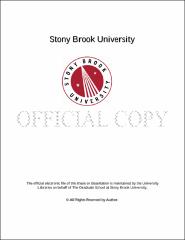| dc.identifier.uri | http://hdl.handle.net/11401/76767 | |
| dc.description.sponsorship | This work is sponsored by the Stony Brook University Graduate School in compliance with the requirements for completion of degree. | en_US |
| dc.format | Monograph | |
| dc.format.medium | Electronic Resource | en_US |
| dc.language.iso | en_US | |
| dc.publisher | The Graduate School, Stony Brook University: Stony Brook, NY. | |
| dc.type | Dissertation | |
| dcterms.abstract | Is the decision making of the Supreme Court of the United States influenced by the health of the national economy? In the development of the literature on the Supreme Court, scholars have mainly focused on how legal, attitudinal, and strategic considerations impact judicial decision making. There has been less work focusing on exogenous factors such as the economy. In this dissertation, I hypothesize that the Supreme Court is responsive to the national economy during multiple stages of the decision making process of the Court--case selection, voting, and the opinion stage. In a sense, I posit that the justices of the Court are similar to voters and elected officials in that they are interested in and influenced by how the economy is performing. Examining the potential influence of economic cues is important to scholars of the Supreme Court in that it is another source of information the Court is potentially using in making their decisions. Also, finding a link between the economy and decision making provides further evidence that the Court is perhaps not immune to the same political and societal pressures other government offices are. To empirically test these hypotheses, I use data on Supreme Court cases and national economic indicators going back as far as 1946. Findings indicate that as the economy is doing worse--as measured by consumer sentiment--the Court is more likely to hear cases related to economic issues. Furthermore, the Court becomes less reliant on ideology in their case decisions and becomes more likely to vote against the preferences of the federal government in response to an economy that is doing worse. Finally, during times when the economy is doing worst--during national recessions--the coalitions that vote for the winning side in the case are smaller. | |
| dcterms.available | 2017-09-20T16:51:09Z | |
| dcterms.contributor | Lebo, Matthew | en_US |
| dcterms.contributor | Segal, Jeffrey A. | en_US |
| dcterms.contributor | Norpoth, Helmut | en_US |
| dcterms.contributor | Epstein, Lee. | en_US |
| dcterms.creator | Johnson, Joshua Matthew | |
| dcterms.dateAccepted | 2017-09-20T16:51:09Z | |
| dcterms.dateSubmitted | 2017-09-20T16:51:09Z | |
| dcterms.description | Department of Political Science. | en_US |
| dcterms.extent | 142 pg. | en_US |
| dcterms.format | Application/PDF | en_US |
| dcterms.format | Monograph | |
| dcterms.identifier | http://hdl.handle.net/11401/76767 | |
| dcterms.issued | 2014-12-01 | |
| dcterms.language | en_US | |
| dcterms.provenance | Made available in DSpace on 2017-09-20T16:51:09Z (GMT). No. of bitstreams: 1
Johnson_grad.sunysb_0771E_12024.pdf: 1283460 bytes, checksum: c56c1b8a2ed6247923fbb64b9b07837b (MD5)
Previous issue date: 1 | en |
| dcterms.publisher | The Graduate School, Stony Brook University: Stony Brook, NY. | |
| dcterms.subject | Economic Activity, Judicial Politics, Supreme Court | |
| dcterms.subject | Political Science | |
| dcterms.title | The Impact of the National Economy on Supreme Court Decision Making | |
| dcterms.type | Dissertation | |

